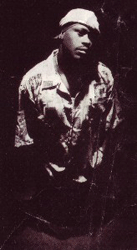by Peter Rubin
When he gets up and walks over to the window, chewing his words, you can see that he's a little older. The torso's a little thicker, the cranial stubble's considering a slow retreat. And when he speaks, it's in the measured tones of someone who's used to thinking. He's had plenty of time to do it-- five Gangstarr albums with his partner, DJ Premier, and two Jazzmatazz compilations have, to paraphrase his younger self, made him more than just the average rebel. So when he opens his mouth, DJ-producer Guru's signature rasp couches a sentiment that's not surprising. "I'll break it down like Herbie Hancock told me," he says. "In life, and as an artist, to go forward, to evolve, to change with the times, for you even to feel comfortable with yourself, for you to feel like you're not stagnant, to feel like you're growing-you have to create a box. And sometimes you gotta step out the box--but not too far from the box, and always relative to the box." He's talking generally, of course, but it rings doubly true when placed in the context of his newest project: Guru's Jazzmatazz: StreetSoul (Virgin), the third in his series of big- name artist collaborations on projects Guru writes and executive produces.
Funny term, "soul." It's one of those words, like "indie" or "electronica," that get tossed around too damn often. After Maxwell broke in the mid-90's, writers began falling all over themselves predicting a "soul renaissance." Whether or not that prophecy was fulfilled, it points to something we want from music. Something to counteract what passes for R&B in today's SoundScan wasteland. Something to show us that Marvin and Curtis are dead but not gone. Something political, something truer than the let-me-freak-you-right- now-girl nothings spilling from the impossibly well-trimmed goatees of thugged-out troubadors.
And it's happened. People like Common, D'Angelo, OutKast and Lauryn Hill realized that soul isn't necessarily falsetto and chilled wine. Soul is essence, spirit-and exposing that essential self on records that can blow people out of the water.
While this new generation of inner- city bluesmen was honing its chops, Guru was working through his own soul music: the jazz he grew up with in Boston. Gangstarr's first single, "Words I Manifest," hinged on a horn sample from Dizzy Gillespie's "Night in Tunisia," and the troupe garnered further attention off the strength of "Jazz Thing," their track from Mo' Better Blues. The two Jazzmatazz comps continued Guru's explorations, finally bringing Donald Byrd and Roy Ayers to a culture that had long sampled them. The end result was admittedly mixed, opening up some people and turning off others. It's tough to own up to, but a lot of hip-hop kids just weren't feeling the Jazzmatazz joints. To a lot of Gangstarr fans, the albums, which Guru freely admits were "experimental," were preachy, gimmicky. He fights the labels the projects got. "The next thing you know, motherfuckers started saving 'jazz- rap.' Like, all over the world. I'm like, 'This is corny."' But in the wake of more explicitly jazz-focused acts like Digable Planets and Dream Warriors, people were all too happy to pigeonhole him.
To Guru it's all hip-hop. "Hip-hop is everywhere," he says. "Hip-hop is Coca- Cola; anything in today's society is hip- hop. We're running the world." To illustrate his point he nods at the television, where a young cat stalks the stage with a do-rag, one pant leg up and fresh Tims on. Sure, he's a hip-hop caricature except he's singing a love song. Soul is hip-hop; hip-hop is soul.
This compatibility becomes clear on the album, where a kind of unity bonds the 13 tracks. Guru has refined and defined, as he says, "because it's not an experime~nt anymore," And despite his ever-present Brooklyn bad boy style, the album is very much in the vein of the Native Tongues aesthetic-- a salon of like-minded heads who came to the party because it's all love. For the first time, he's enlisted other producers, as well as a stable of vocalists that reads like a Who's Who of the New School. Erykah Badu rolls through on "Plenty," a track with playful rapport that evokes the vibe of the old Louis and Ella Verve sides. Bilal, who graced Common's newest venture, lends "Certified" an exuberance that works perfectly with the organ stabs on Jay Dee's bouncy track. The older generation still represents, with Isaac Hayes and Herbie Hancock lending an experienced hand. The Roots, Macy Gray and Donell Jones all contribute-- names that have an immediate cachet among hip-hop babies. Calculated or not, it makes for a totally different feel.
Keith Elam, the man behind the Guru pseudonym, is the contemplative type. But alongside the thoughtfulness and the positivity--qualities that permeate the StreetSoul project-there's something approaching resentment in Guru's voice.. He's animated, pacing the room, tying and retying his boots. His motivation comes clear: It's time to collect. "I was one of the first people in hip-hop to work with vocalists," he insists. "Now all of a sudden, it's commonplace on every quote-unquote gangster record to have a vocalist. So again, we're at the forefront. Doing this new album is taking my crown down off the shelf and putin' it back on my head. At this point, I've got nothing to prove. I never went platinum. What the fuck I gotta live tip to?" Granted, it's tough to swallow the fact that a decade of respect isn't reflected in sales, but with projects like StreetSoul, Guru is ensuring that his name is getting the shine it deserves.

